‘Who still buys iPads?’ Gadget fans wonder why Apple is still releasing new tablets despite the devices making up only 6% of sales
When Steve Jobs first introduced the iPad in 2010, he claimed it would be more powerful than a smartphone and more convenient than a laptop.
More than a decade later, however, the iPad appears not to have fulfilled this promise.
As smartphones have gotten bigger and more powerful, iPad sales have fallen; this year represents just six percent of Apple’s revenue.
Nevertheless, Apple made headlines this week after unveiling a new iPad Pro and iPad Air.
This has led some gadget fans on social media to wonder: who still buys iPads?
Since the iPad launched in 2010, sales have fallen from their original peak, leaving many wondering, “Who buys iPads anymore?”
When it first appeared, the iPad was Apple’s most successful product launch to date, shifting more than a million tablets in less than a month and selling 25 million in a year.
But since that much-hyped release, the product seems to have steadily fallen out of favor.
In the second quarter of 2024, Apple revealed that iPad revenues fell 17 percent from the same period last year – from £5.36 billion ($6.7 billion) to £4.48 billion ($5.6 billion) .
Similarly, iPad sales fell 25 percent in the first quarter of the year.
While Jobs predicted that the iPad would carve out a niche between the iPad and the Macbook, this may be one of the few times the Apple founder missed the mark.
According to research firm IDC, approximately 1.1 billion smartphones were sold worldwide in 2023, while only 130 million iPads and other tablets were sold.
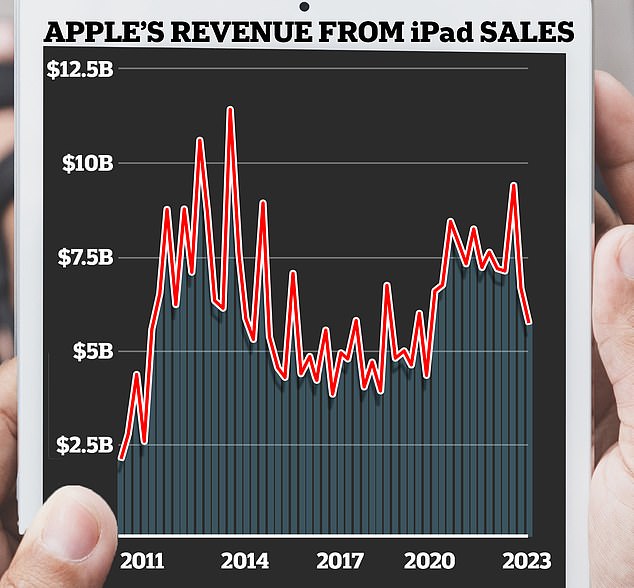
While the tech giant raked in a staggering $23 billion in quarterly profits in 2023, this was largely due to surging iPhone sales. iPad sales, meanwhile, fell by 10 percent and will continue to decline in 2024
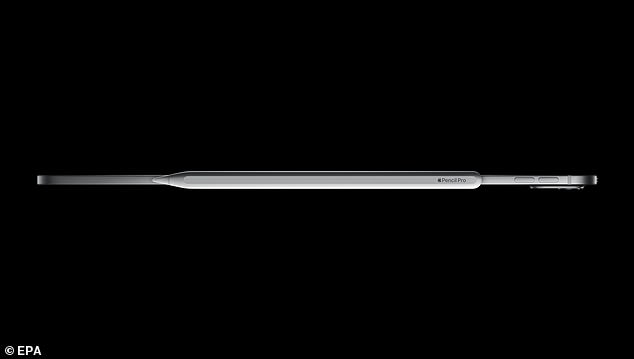
This comes as Apple announces a number of upgrades to its tablet line, including a new iPad Pro (pictured), Apple’s thinnest product.
This suggests that tablets are simply an inferior technology choice compared to the convenience of increasingly capable smartphones.
And according to some gadget fans on social media, the iPad really isn’t worth buying.
On X (formerly Twitter), a tech enthusiast wrote: “Who buys iPads anymore?”
Another asked: ‘Are people still getting iPads? No one needs an iPad except graphic designers and bad parents.”
Meanwhile, one commenter added that “people buy iPads only to realize they don’t need an iPad.”

On X, formerly Twitter, gadget fans wondered why anyone would want to buy an iPad

Some commentators believe that the iPad doesn’t perform any specific task well enough to create a niche between a laptop and a smartphone.

Some commenters even expressed regret about buying an iPad
The iPad still has its defenders on social media, including those who claim it’s a good option for note-taking.
One student wrote on X that the iPad was “a game changer.”
They added: ‘There is no need to carry heavy books. Take notes on iPad and access them from any device. Searching for details in my study notes has never been so seamless.’
Another commenter claimed that “lawyers are actually lining up to buy iPads.”
The commenter noted that the tablets were much more convenient in the courtroom than carrying bags of files or documents, and that they were a “huge relief.”

However, the iPad still has its defenders, with some arguing that it is a good tool for students to take notes

One social media user even claimed that lawyers are “lining up to buy iPads” because of their convenience
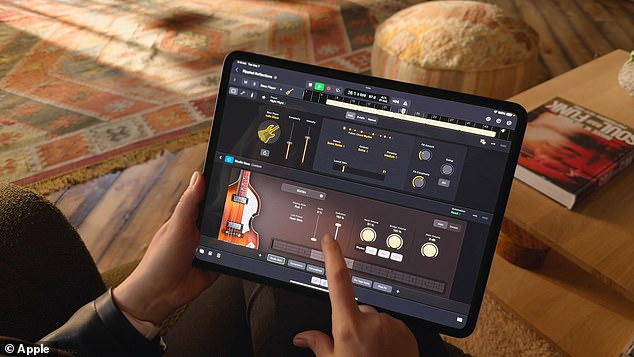
Apple may be hoping that the larger screens and powerful processors of its new iPad line can lure more customers looking to upgrade from their old tech
At Apple’s recent ‘Let Loose’ event, CEO Tim Cook revealed that the company was still willing to invest in its tablet line.
Mr Cook called the event “the biggest day for iPad since its launch” and unveiled some major upgrades to the iPad Pro, iPad Air and iPad accessories.
The iPad Air has received a significantly larger option in the new 13′ model for those who want more screen real estate without the cost of the Pro model.
Both the 11′ model, which costs £599 (US price $599), and the 13′ model which costs £799 ($799), also get the M2 chip.
According to Apple, this should make both models about 50 percent faster than the 2020 model that ran on the M1 chip.
But the biggest upgrades were reserved for the iPad Pro, which will now feature the new M4 chip.
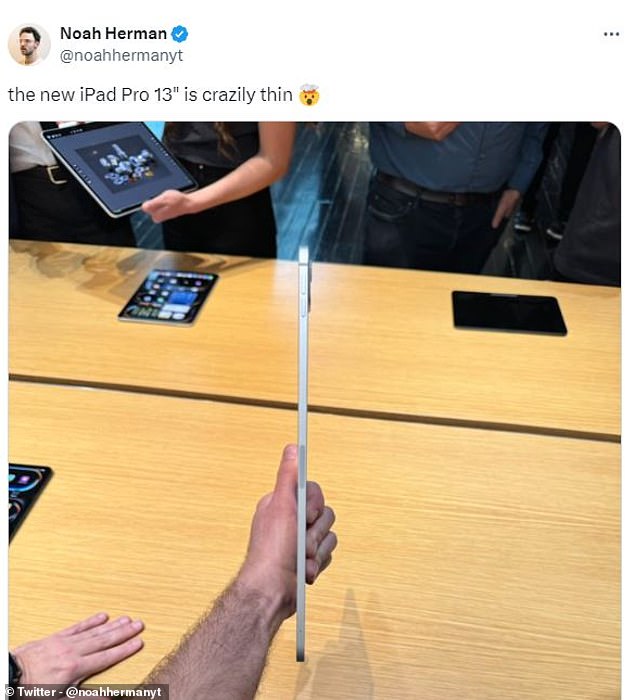
The new iPad Pro 13′ is just 5.1mm thick, making it the thinnest product available from Apple and much thinner and lighter than previous models
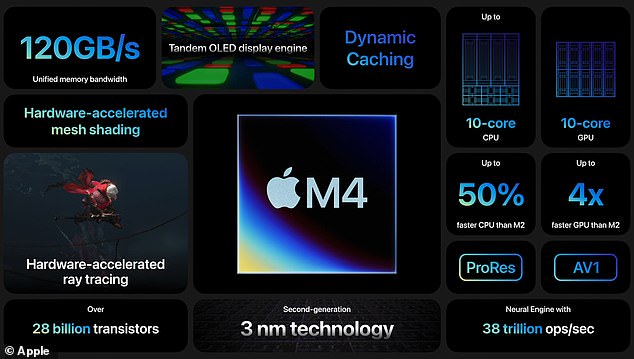
The biggest change is the inclusion of the M4 chip in the iPad Pro, which should be 50 percent faster than the previous M2 chip
Tim Cook called this “an insanely powerful chip for AI” and promised it would be at least 50 percent faster than the older M2 chip.
The iPad Pro is also now significantly thinner and lighter than before and now has sharper displays thanks to what Apple calls the Ultra Retina XDR.
The £999 ($999) 11′ model is 5.3mm thick, while the £1,299 ($1,299) 13′ version is just 5.1mm thick – making it the thinnest is an Apple product.
The Magic Pencil, Apple’s £129 stylus, also gets haptic controls in the form of a pinch function and the ability to roll the pencil to change the brush shape.
Those who are prone to losing their pen will also be relieved to know that the device is now compatible with the Find My feature.
The Magic Keyboard attachment also received some attention, with an aluminum exterior and a larger trackpad that Apple claims “feels like using a MacBook.”
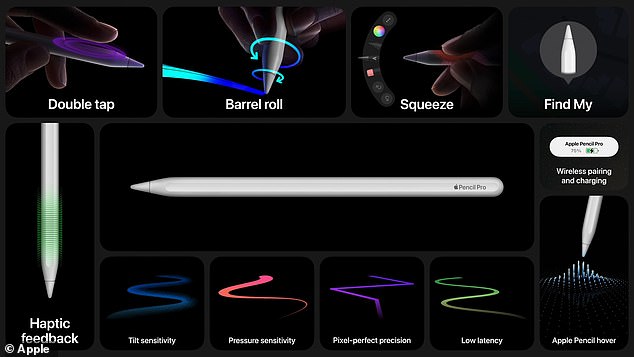
Apple also unveiled upgrades to its iPad accessories, such as the Magic Pencil (pictured), which now offers haptic controls and compatibility with the Find My feature
Despite the iPad’s poor track record, analysts are convinced this could be a step in the right direction.
Paolo Pescatore, analyst at PP Foresight, told MailOnline: ‘The new range includes significant improvements that will appeal to a wide range of users, consumers and businesses.
“Importantly, this comes at a time when current iPad owners are looking to upgrade.”
Mr. Pescatore notes that the options of a larger screen and a more powerful chip could be a powerful incentive for customers looking for an alternative to their current technology.
He adds that this represents “a final step toward ditching the laptop entirely, given its many new features and multitasking capabilities.”
The inclusion of the M4 chip also stands out as a particularly strong selling point due to its AI potential.
This powerful chip is believed to be 400 times faster than the M2 when it comes to graphics and features an AI ‘neural processor’ that is faster than anything on the market.
With Apple’s Developer Conference next month, it’s possible the company is ready to unveil more AI-based upgrades to leverage this hardware.
